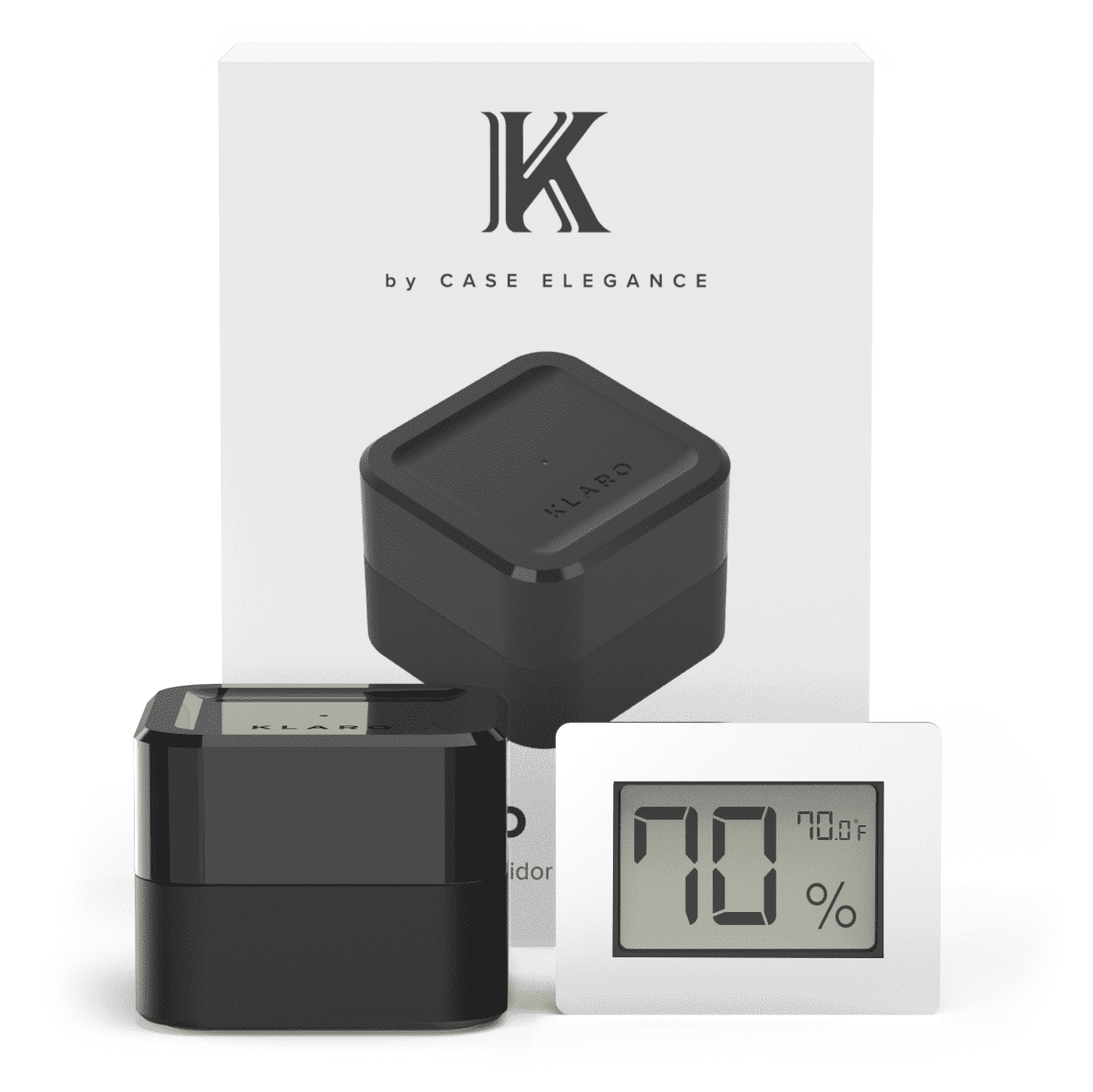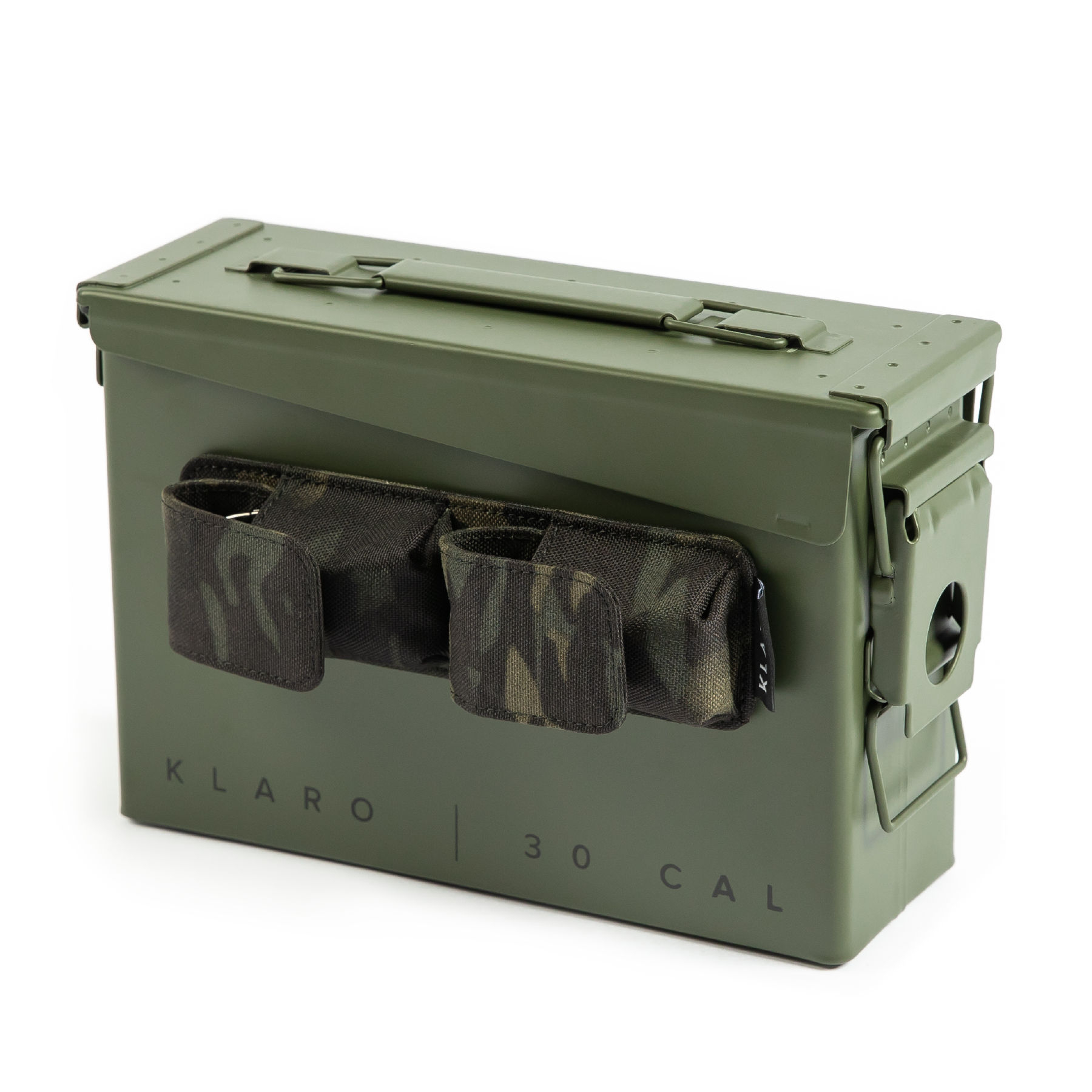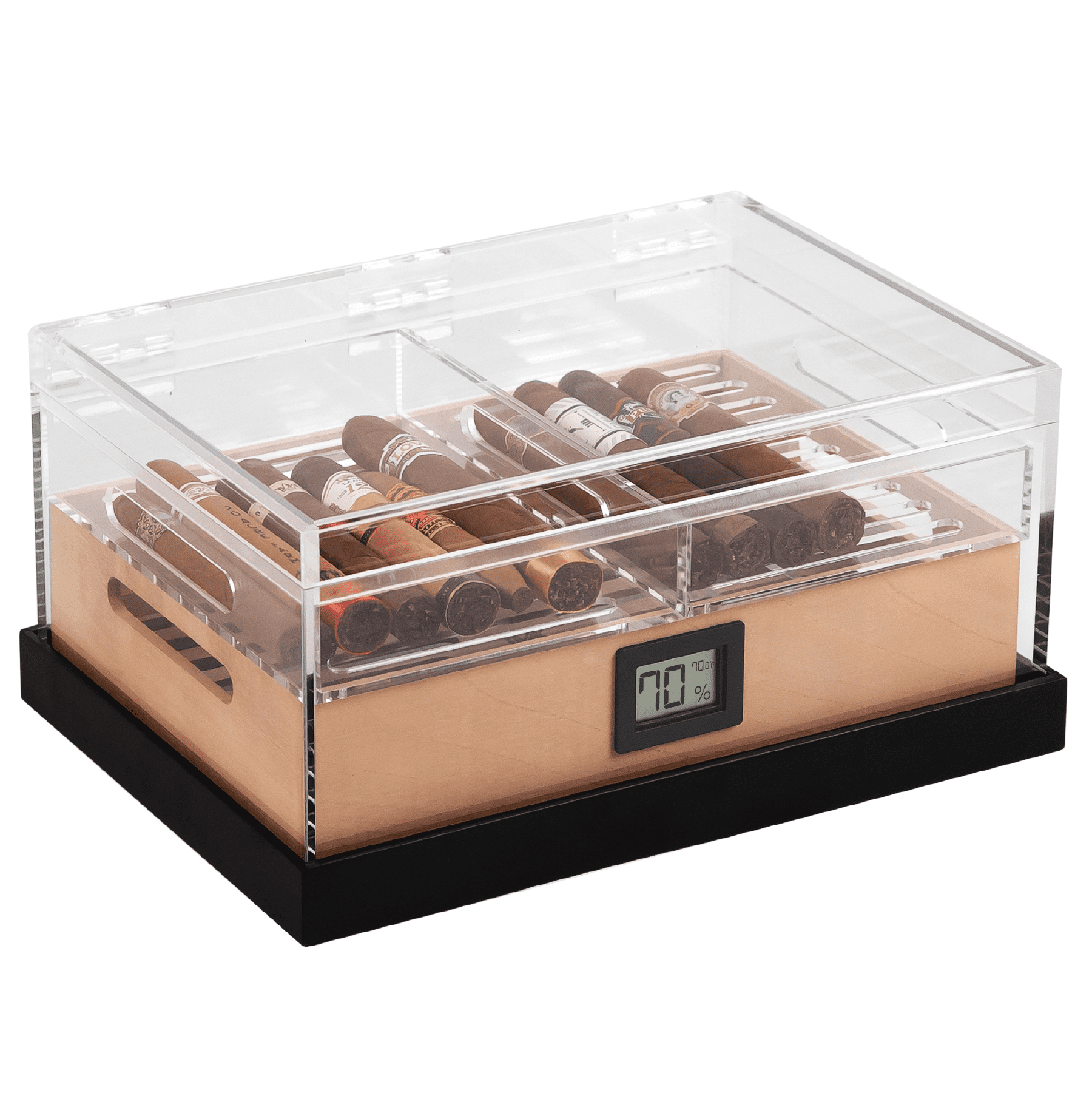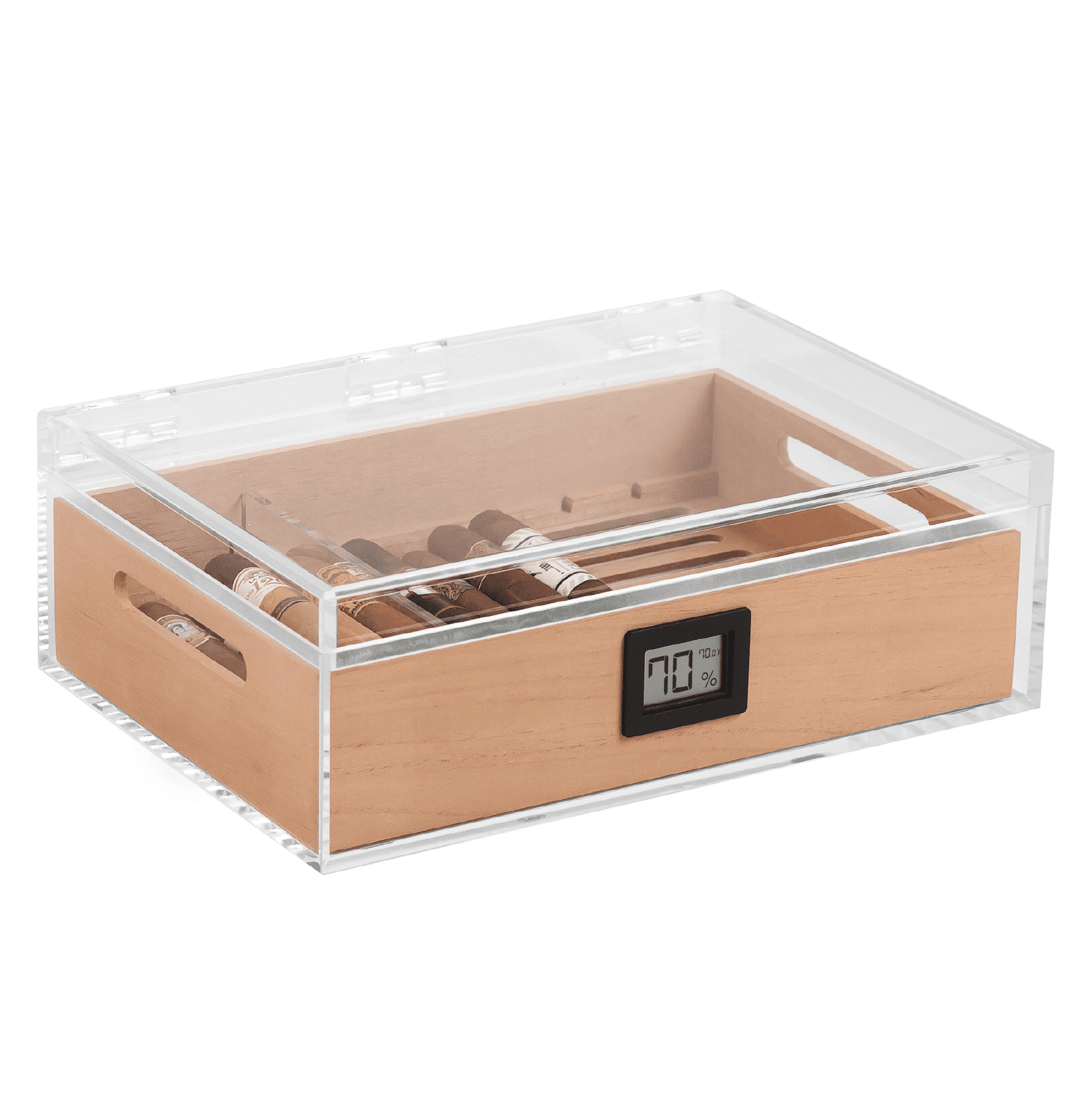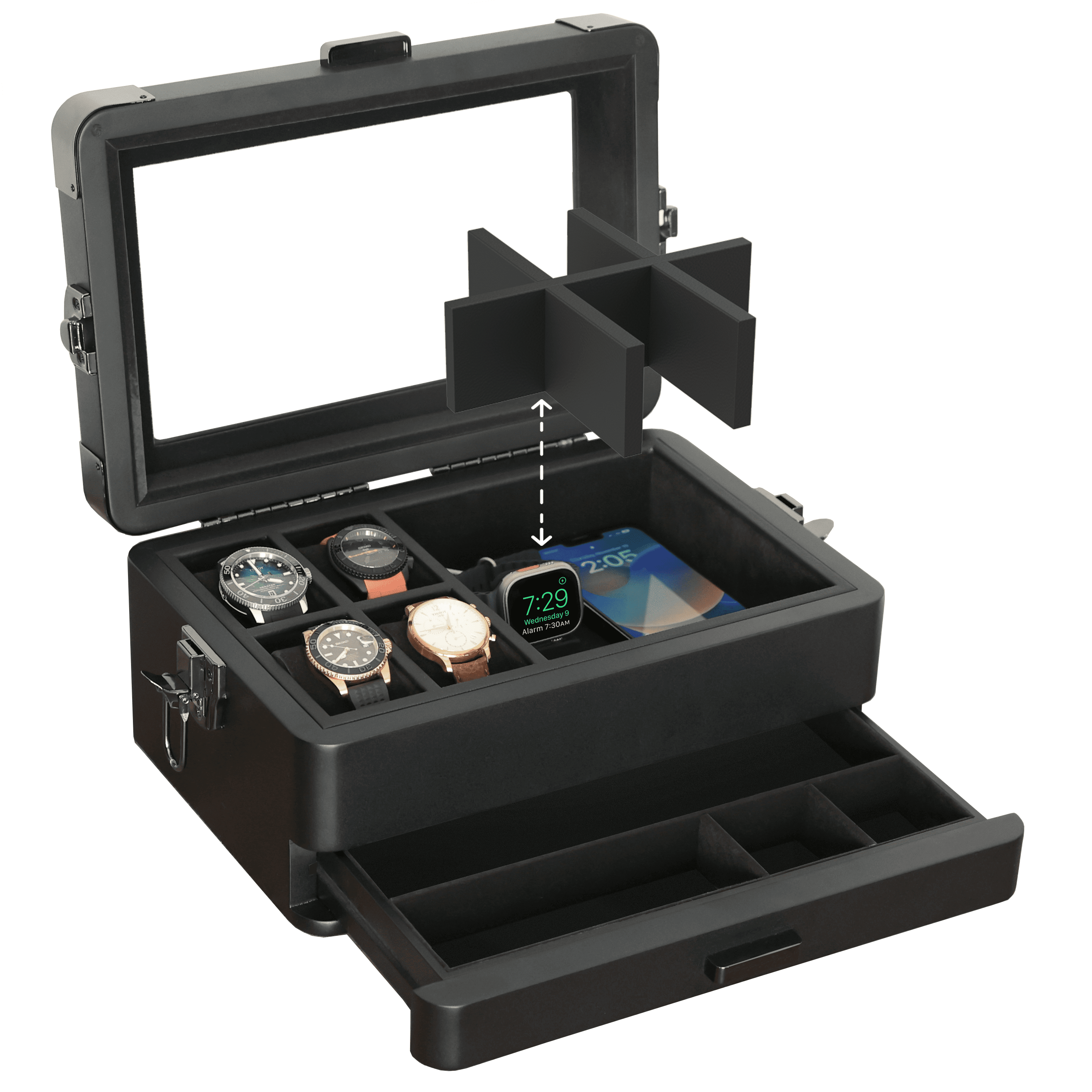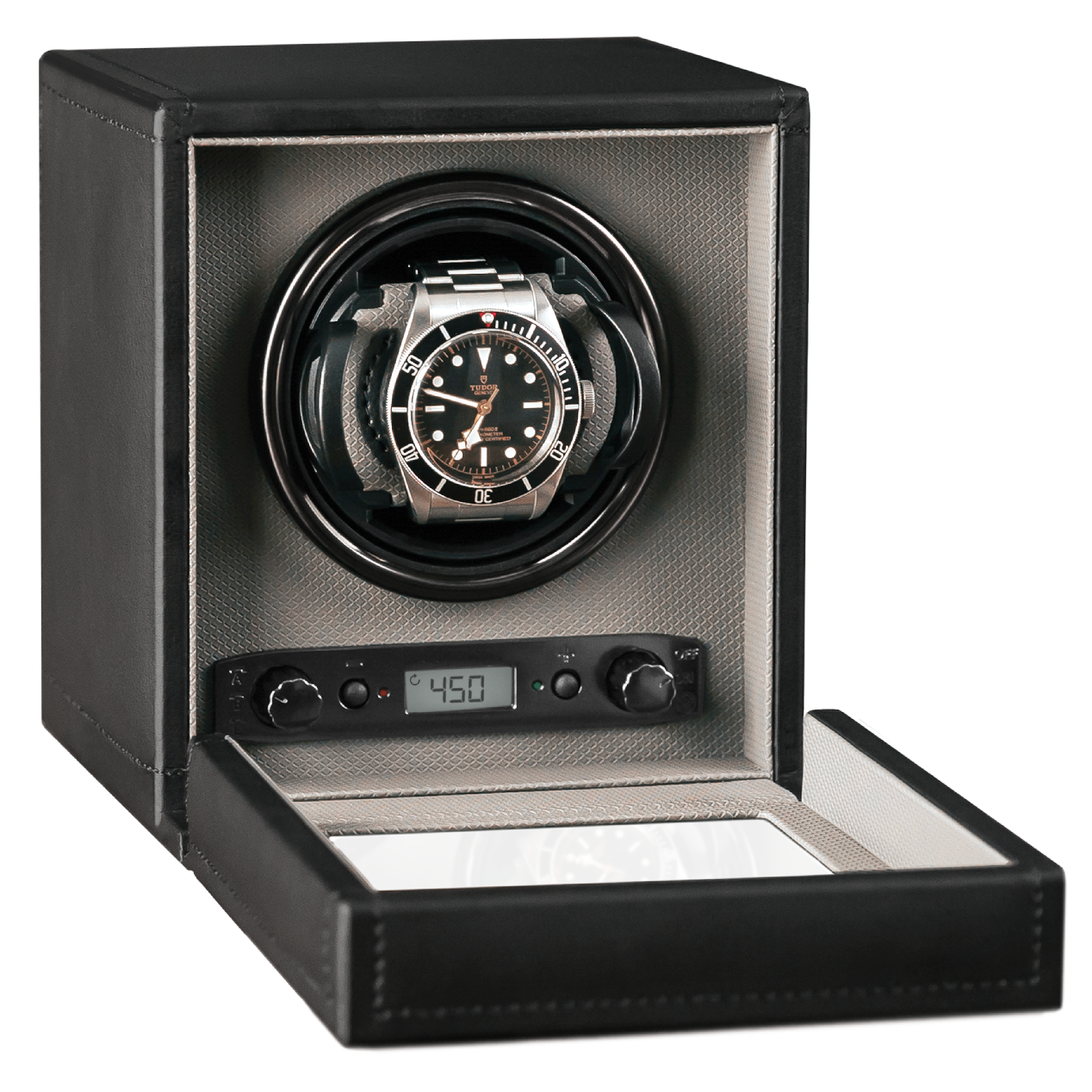A well-maintained humidor is essential for preserving the quality and flavor of your cigar collection, and among the various factors that contribute to the perfect storage environment, humidity plays the most important role. Let’s delve into the intricacies of humidor humidity, its impact on cigars, and provide you with valuable insights on how to maintain the ideal humidity levels in your humidor.
If you've ever wondered what does a humidor do, humidity is really where to focus your understanding. Whether you are a seasoned aficionado or a novice enthusiast, understanding and managing humidity in your humidor is paramount to better enjoying, preserving, and exploring the complexity of your cigars.
Humidity in Humidor: What Does It Mean?
Humidity in humidor boxes refers to the moisture content in the air within the storage unit. It’s measured using a hygrometer, a device specifically designed to gauge humidity levels.
Proper humidity is vital because cigars are hygroscopic, meaning they readily absorb and release moisture from their environment. When cigars are exposed to excessively low or high humidity, they can dry out or become overly moist, leading to undesirable changes in flavor, burn, and overall smoking experience.
it's important to note that the type of wood used in the construction of the humidor plays a significant role in maintaining the desired humidity levels.
Humidor wood, typically made from Spanish cedar (Cedrela odorata), is widely regarded as the ideal material for cigar storage. Spanish cedar possesses natural properties that contribute to the preservation and enhancement of cigars. Its porous nature allows the wood to absorb and release moisture, helping to regulate humidity levels within the humidor.
The Spanish cedar lining of a humidor acts as a moisture buffer, helping to maintain a stable environment for your cigars. It helps prevent rapid changes in humidity by absorbing excess moisture and releasing it back into the air when needed. Additionally, Spanish cedar has aromatic qualities that can enhance the flavors and aromas of stored cigars.
The use of Spanish cedar extends beyond the lining of the humidor. Many humidors also feature cedar trays or dividers, which provide additional surface area for moisture absorption and distribution. These cedar components contribute to the overall humidity management within the humidor.
It's important to note that the quality of the humidor wood and the craftsmanship of the humidor itself can impact its ability to maintain humidity levels effectively. Well-constructed humidors with tight seals and properly seasoned cedar linings are essential for achieving and maintaining the desired humidity range.
When selecting a humidor, pay attention to the quality of the wood used, ensuring it is genuine Spanish cedar. Inferior materials may not provide the same level of moisture regulation and aromatic benefits. Additionally, consider the humidor's construction and attention to detail to ensure it will effectively preserve your cigars' quality.
By understanding the role of humidor wood, particularly Spanish cedar, you can appreciate its significance in humidity management and make informed choices when selecting a humidor for your cigar collection.
The Best Humidor Humidity For Cigars
Maintaining the ideal humidity in your humidor is crucial for the proper storage and aging of cigars. Humidity directly affects the condition, flavor, and overall smoking experience of cigars. Let's explore how humidity impacts cigars and why achieving the best humidor humidity is essential.
Flavor Preservation - Cigars are made from carefully aged and fermented tobacco leaves, which contain essential oils responsible for their distinctive flavors. When stored in a controlled humidity environment, cigars can maintain their moisture content, ensuring that these oils remain intact. This preserves the flavor profile and allows the cigars to develop their desired taste characteristics over time.
Preventing Drying Out - Insufficient humidity can cause cigars to dry out, resulting in a lack of flavor and a harsh smoking experience. When cigars lose moisture, their oils and flavors become diminished, leading to a dull and lifeless smoke. Dry cigars are also prone to burning unevenly, resulting in an uneven draw and an unsatisfactory smoking experience.
Avoiding Over-Humidification - On the other end of the spectrum, excessive humidity can also be detrimental to cigars. Overly humid conditions can cause the tobacco leaves to absorb too much moisture, leading to swelling and an overly moist texture. This can result in a tight draw, difficulties with combustion, and a diminished flavor profile.
Burn and Draw - Proper humidity plays a crucial role in the burn and draw of cigars. When cigars are stored in the ideal humidity range, the moisture content allows for a steady and even burn. This results in a consistent draw, providing a smooth smoking experience. In contrast, cigars stored in improper humidity conditions can burn unevenly, resulting in an uneven and often unpleasant smoking experience.
Aging and Maturation - Many cigar enthusiasts enjoy aging their cigars to enhance their flavors and complexity. Proper humidity is vital for the aging process, as it allows the cigars to develop and mature gradually. In an ideal humidity environment, the tobacco leaves can age gracefully, allowing the flavors to meld and evolve over time. Improper humidity can accelerate or hinder the aging process, leading to suboptimal results.
Mold Growth - Excessive humidity levels within a humidor can create a favorable environment for mold growth. Mold thrives in damp conditions, and if the humidity exceeds the desired range, it can promote mold spore activation and proliferation. Mold can not only affect the appearance of cigars but also impact their flavor and overall quality. Proper humidity control and regular monitoring are crucial to preventing mold growth in your humidor.
What Is Humidor Ideal Humidity?
The ideal humidity range for a humidor typically falls between 65% and 72%. This range provides a suitable balance that allows cigars to retain their essential oils, ensuring optimal flavors and preventing dryness or mold growth. Achieving and maintaining the ideal humidity level is essential to the long-term preservation of cigars. Consistency in humidity levels is key, as fluctuations can lead to rapid aging, cracking, or even spoilage of cigars.
Maintaining the ideal humidity in a humidor is crucial, but it can be a challenging task. The main reason behind this difficulty is the constant battle against external factors that can impact humidity levels. Factors such as ambient temperature, seasonal changes, and the quality of the humidor's seal can all influence the humidity within the storage unit.
External temperature fluctuations can affect the rate of evaporation and condensation, directly impacting humidity levels. In warmer climates or during the summer months, humidity tends to rise, requiring additional attention to maintain the desired range. Conversely, colder temperatures can lead to reduced humidity, potentially causing cigars to dry out.
The quality of the humidor seal also plays a significant role in humidity control. A well-constructed humidor with a tight seal ensures minimal air exchange between the interior and exterior environments, allowing for better humidity regulation. However, over time, seals can deteriorate or become compromised, leading to fluctuations in humidity levels. Regular inspection and maintenance of the humidor's seal are essential to ensure optimal humidity control.
To establish an environment that maintains the ideal humidity for your cigars, proper seasoning of your humidor is crucial. Seasoning the humidor helps to prepare the cedar lining and achieve optimal moisture content for storing cigars. Let's explore the process of seasoning a humidor in the next section to ensure your humidor is ready to provide the ideal humidity for your cigar collection.
How to Measure For Ideal Humidor Humidity
To ensure accurate monitoring of humidity levels in your humidor, it is essential to use a reliable hygrometer. A hygrometer is a device specifically designed to measure and display the relative humidity (RH) inside the humidor. Here's why a reliable hygrometer is crucial:
Accurate Humidity Readings - A reliable hygrometer provides precise and consistent humidity readings, allowing you to maintain the ideal humidity range for your cigars. This ensures that you have accurate information about the moisture content within the humidor, enabling you to make informed adjustments when necessary.
Monitoring Humidor Performance - By regularly monitoring the humidity levels with a hygrometer, you can assess the performance of your humidor over time. This helps you identify any fluctuations or issues that may arise, such as variations due to seasonal changes or potential problems with the humidification system.
Preventing Cigar Damage - Inaccurate or unreliable hygrometers may display incorrect humidity levels, leading to potential damage to your cigars. If the readings are off, you may inadvertently expose your cigars to overly dry or excessively humid conditions, affecting their flavor, texture, and overall quality.
Investing in a quality hygrometer and maintaining its calibration will provide you with the confidence that you are accurately monitoring the humidity in your humidor, safeguarding your cigars and enhancing your overall cigar experience.
What to Know When Seasoning Humidor Boxes
When you acquire a new humidor or haven't used your existing one for some time, it is crucial to season it properly before introducing your cigars. Seasoning involves saturating the humidor's cedar lining with moisture to establish a stable internal environment. To season your humidor, follow these steps:
Clean the interior - Use a clean cloth to wipe the interior surfaces of the humidor, removing any dust or debris.
Distilled water or humidor solution - Follow your particular humidor’s instructions for seasoning. For Klaro models, you will fill the humidor tray (the humidor humidifier) with humidor solution to activate the crystals. We offer specific humidor seasoning instructions for each individual model.
Wait and monitor - Close the humidor and let it sit for 24-48 hours. During this time, the cedar will absorb the moisture, gradually increasing the humidity within the humidor.
Check and repeat - After the initial seasoning period, check the humidity levels using a calibrated hygrometer. If the humidity is below the desired range, repeat the seasoning process until the desired level is reached.
Seasoning humidor boxes is a process — it might take several attempts before humidity stops fluctuating. But follow our ultimate guide to humidor seasoning to make sure you know all you need to kno when seasoning your humidor.
Humidor Temperature and How It Affects Humidity
While humidity is critical, it is closely intertwined with temperature. Temperature fluctuations can directly impact humidity levels within the humidor. The ideal temperature for a humidor ranges between 65°F and 70°F (18°C to 21°C). Higher temperatures can cause increased evaporation, leading to a drop in humidity, while lower temperatures can impede the moisture absorption process. Maintaining a consistent temperature is crucial to preserving the optimal humidity for your cigars.
The temperature you store your humidor will obviously affect its internal temperature. But you can be additionally vigilant by storing your humidor away from sunlight and heating and cooling vents.
When Your Humidor Is Too Humid
Occasionally, you may find that your humidor's humidity exceeds the desired range. High humidity can result from factors such as external climate conditions, over-seasoning, or excessive humidity from a humidifier. Signs of excessive humidity include overly moist cigars, a sticky feeling inside the humidor, or visible condensation on the lid or walls. To address high humidity, follow these steps:
Remove excess moisture - Open the humidor and allow it to air out for a few hours, letting excess moisture escape. If necessary, use a dry cloth or paper towel to gently absorb any visible condensation.
Increase airflow - Ensure proper airflow within the humidor by adjusting the positioning of your cigars and accessories. Avoid overcrowding, as it can restrict airflow and exacerbate humidity issues.
Reassess the humidifier - If your humidor has a humidifier, check its condition and functioning. Consider using a different type of humidifier or adjusting the amount of water or solution it contains to maintain the desired humidity level.
Humidor Mold
Mold growth is a common issue that can occur when humidity levels are too high and airflow within the humidor is inadequate. Mold can negatively affect both the appearance and flavor of your cigars. To prevent mold growth, ensure proper ventilation and periodically inspect your humidor for any signs of mold. If mold is detected, remove the affected cigars, clean the humidor thoroughly, and re-establish the ideal humidity levels before reintroducing your cigars.
Mold growth in a humidor can be a frustrating issue that needs to be addressed promptly. It is essential to regularly inspect your humidor for any signs of mold to prevent its spread and protect your valuable cigar collection. Here are some key indicators that mold may be present in your humidor:
Visible Spots or Discoloration - Mold often appears as fuzzy, powdery, or patchy spots on the interior surfaces of the humidor, including the cedar lining, dividers, or trays. These spots can be green, blue, white, or black in color, depending on the type of mold.
Musty Odor - Mold growth is often accompanied by a distinct musty or earthy smell. If you notice an unusual odor when opening your humidor, it could be an indication of mold presence.
Changes in Cigar Appearance - Inspect your cigars for any visible signs of mold. Mold-infested cigars may have discolored patches, fuzzy texture, or a slimy film. If any of your cigars exhibit these characteristics, it's essential to remove them immediately to prevent the spread of mold to other cigars.
How To Lower Humidor Humidity
If your humidor consistently experiences high humidity levels, additional measures may be required. Here are some strategies to help lower humidity:
Use a dehumidifier - Consider using a small dehumidifier specifically designed for humidors to extract excess moisture from the air. Be sure to choose one suitable for your humidor size. For small humidors, you probably won’t be able to use a dehumidifier and these are better for humidor cabinets and walk-in humidors.
Silica gel packs: Place silica gel packs inside your humidor to absorb excess moisture. These packs are available in various sizes and can help regulate humidity levels effectively.
Check the seal: Inspect the humidor's lid and walls for any gaps or imperfect seals that could be allowing excess moisture to enter. Address any issues by adjusting or replacing the seal to ensure a tight closure.
The relationship with your humidor and humidity is ongoing, and you may need to address too much humidity in your humidor more than once. Check out our complete review of how to lower humidor humidity for more tips and tricks.
How To Increase Humidity in Humidor
In many cases, you will need to increase the humidity levels within your humidor. Here are a few methods to achieve this:
Humidification devices - Utilize humidifiers specifically designed for humidors, such as electronic or passive humidifiers, to introduce moisture into the environment. These devices help maintain consistent humidity levels, ensuring your cigars stay in optimal condition.
Most Klaro humidors use a specifically designed humidification device known as the hydro tray. This tray houses humidor solution and absorbing crystal gels to allow humidity directly into the cigar storage environment. If your Klaro humidor is experiencing a lower humidity level than you’d like, you can simply add additional humidor solution to your humidor tray.
Humidification beads - Alternatively, you can use humidity-regulating beads made from materials like silica gel or propylene glycol. These beads absorb and release moisture as needed, maintaining stable humidity levels.
Monitor and adjust - Regularly monitor the humidity levels using a reliable hygrometer. If the humidity falls below the desired range, adjust the humidification device accordingly to increase moisture levels.
Seasonal Humidity Variations and Humidor Maintenance
Humidity levels can vary with seasonal changes, affecting the performance of your humidor. Understanding these variations and implementing proper maintenance practices will help you maintain optimal humidity throughout the year. Here's what you need to know:
Summer and High Humidity
During warmer months or in regions with high humidity, the ambient moisture content can rise. This can lead to increased humidity levels in your humidor. Monitor the humidity closely and make adjustments as necessary, such as reducing the frequency of humidifier refills or using a dehumidification device.
Winter and Low Humidity
In colder climates or during winter, the air tends to be drier, which can result in lower humidity levels. This can cause cigars to dry out more quickly. To counteract this, consider using additional humidification devices or increasing the frequency of humidifier refills. It's important to regularly monitor the humidity and make adjustments to maintain the ideal range.
Klaro offers a special type of humidor solution created specifically for the colder months of the year when it becomes more difficult to regulate humidity. Be sure to try our Winter + Dry Climate Humidor Solution that will help regulate your humidity.
Humidor Maintenance
Regular maintenance of your humidor is crucial for optimal performance. Check the humidor's seal periodically to ensure it is airtight, as a compromised seal can lead to fluctuations in humidity. Clean the humidor's interior with a cloth or sponge dampened with distilled water to remove any dust or residue that may affect humidity regulation.
By staying aware of seasonal humidity variations and implementing proper maintenance practices, you can effectively manage humidity levels in your humidor throughout the year, ensuring your cigars remain in the ideal condition for long-term storage and enjoyment.
These additional sections will further enhance the article by addressing the importance of a reliable hygrometer and providing insights into seasonal humidity variations and humidor maintenance.
Best Way to Season Humidor Boxes
Seasoning humidor boxes properly is crucial for establishing an environment conducive to storing cigars. The steps for seasoning humidor boxes are similar to those mentioned earlier for seasoning a humidor. It is essential to prepare the box's interior by wiping it with a damp cloth, using distilled water or a distilled water and propylene glycol solution. Allow the box to absorb moisture and monitor the humidity levels with a hygrometer. Repeat the seasoning process if necessary until the ideal humidity range is achieved.
Proper seasoning of your humidor not only establishes the ideal environment for your cigars but also improves the overall resiliency and performance of the humidor itself. Here's how proper seasoning contributes to the humidor's resiliency:
Moisture Absorption - During the seasoning process, the cedar lining of the humidor absorbs moisture from the humidification medium, whether it's distilled water or a propylene glycol solution. This moisture absorption causes the wood to expand slightly, filling any tiny gaps or pores in the cedar.
Enhanced Sealing - As the cedar absorbs moisture and expands, it helps improve the humidor's seal. A well-sealed humidor is essential for maintaining stable humidity levels over time. Proper seasoning ensures that the wood forms a tight seal, minimizing the chances of humidity fluctuations and external air entering the humidor.
Reduced Risk of Humidity Leaks - Seasoning helps to identify and address any potential leaks or weak points in the humidor. As you monitor the humidity levels during the seasoning process, you can observe if there are any significant drops or rises in humidity, indicating a possible leak. By addressing these issues before storing cigars, you can prevent moisture from escaping or entering the humidor uncontrollably.
Consistent Humidity Control - A properly seasoned humidor maintains a more consistent and stable humidity level. The cedar lining, after absorbing moisture, acts as a natural buffer, releasing moisture when the humidity drops and absorbing excess moisture when the humidity rises. This improved humidity control helps to preserve the integrity of your cigars and ensures a more enjoyable smoking experience.
Longevity and Durability - By properly seasoning your humidor, you enhance its overall durability and lifespan. The cedar's ability to expand and contract with changes in humidity reduces the risk of warping or cracking, preserving the structural integrity of the humidor over time
Protecting Your Investment - Cigars are a cherished investment, and a properly seasoned humidor helps safeguard that investment. By creating an environment with stable humidity, the humidor protects your cigars from drying out, losing flavor, or becoming overly moist, which could lead to mold or other issues.
By dedicating time to properly season your humidor, you improve its resilience, sealing, and humidity control capabilities. This not only ensures the optimal storage conditions for your cigars but also extends the lifespan of your humidor, allowing you to enjoy your cigars for years to come.
Getting Ideal Humidity Humidor Boxes
Once your humidor boxes are properly seasoned and humidity levels are established, maintaining ideal humidity becomes a matter of vigilance. Regularly monitor the humidity with a calibrated hygrometer and make adjustments as needed using appropriate humidification devices or beads











